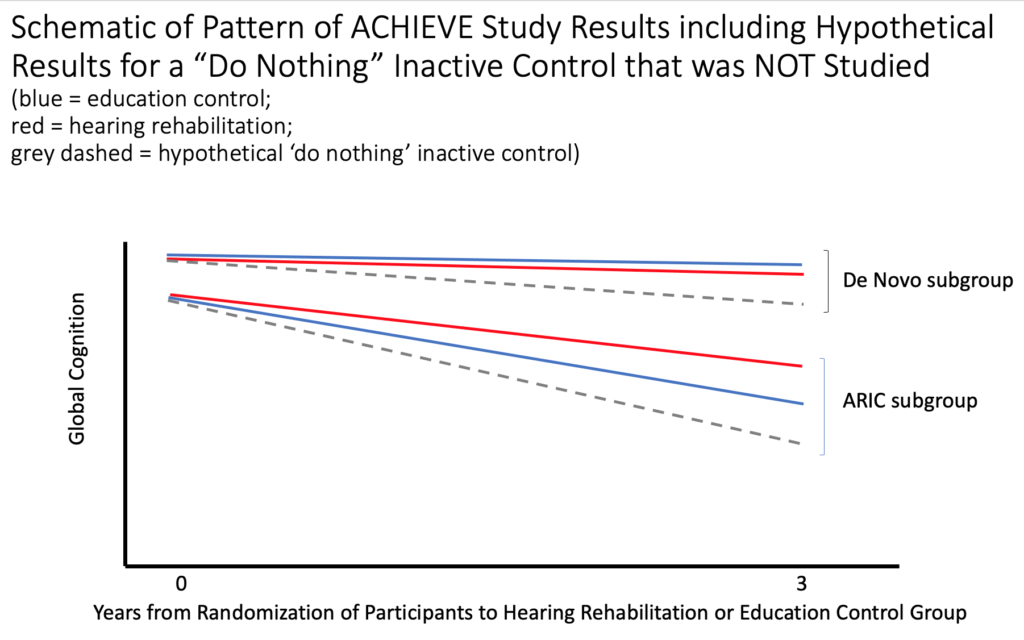Message from the Editor-in-Chief
The ACHIEVE Study Results Do NOT Provide Evidence that “Hearing Aids Prevent Dementia”
Over this past summer, the ACHIEVE study was presented at the Alzheimer’s Association International Conference in Amsterdam and published in the Lancet by Dr. Frank Lin and his colleagues. ACHIEVE stands for Aging and Cognitive Health Evaluation in Elders (and I have no idea where the letter I came from in ACHIEVE). As Kathy Pichora-Fuller reminds us in her column What’s New about Getting Older, publications in the Lancet from several years ago suggested that hearing loss is the greatest POTENTIALLY modifiable mid-life risk factor for dementia. The ACHIEVE study is the first randomized control trial (RCT) to investigate if hearing care can ACTUALLY modify the risk for dementia. Overall, the study concluded that there was NO evidence that hearing care reduced the risk for dementia. The study is so important that we asked Kathy to also write an article in this issue about what ACHIEVE does and does not mean.

In a viewpoint article about the ACHIEVE study published online (August 24, 2023) in JAMA- Otolaryngology-Head and Neck Surgery (doi: 10.1001/jamaoto.2023.2561), Drs. Jan Blustein, Barbara Weinstein, and Joshua Chodosh point out an important distinction between hearing aids preventing dementia (which is unlikely) and hearing aids helping to reduce dementia symptoms (which is more likely, given that we know that hearing better improves cognitive performance). They also point out that for the sub-group of participants in the randomized control trial who were at “higher risk for dementia” (but not for a sub-group who had lesser risk). However, there was a statistically significant benefit from hearing intervention compared to the education control intervention, the difference in decline in cognitive performance was roughly 0.2 standard deviations.
Dr. Kathy Pichora-Fuller, in her column (in my opinion) correctly points out that the days of audiologists working alone in isolation from other professional groups, are limited. ACHIEVE shows that, regardless of the cognitive status of participants, audiologic rehabilitation (AR) is beneficial in terms of daily hearing aid use and self-reported hearing-related communication, but AR should not just be limited to hearing aids. Audiologists should move toward an inter-professional healthcare model that positions better hearing and communication as part of healthy aging by collaborating in inter-professional teams involving all who work with older adults and their increasingly complex needs.
This issue of CanadianAudiologist.ca has a range of fascinating articles starting with our cover feature by Dr. Colleen LePrell from the University of North Texas called “Experimental Medicines for Hearing Loss: Are Prevention or Restoration Feasible?” Dr. LePrell gave a recent webinar for the Canadian Academy of Audiology, which can be found on the Academy’s website at www.CanadianAudiology.ca.
CanadianAudiologist.ca also has our regular contributions for Striking the Right Balance and Mysteries of the Hearing Brain.“ Walking a Mile in Our Patient’s Shoes” is the title of Dr. Salima Jiwani’s first column for CanadianAudiologist.ca. Given Salima’s holistic approach to her clinical work, she was asked to write a new regular column called “Patients First” We welcome Salima to the family and look forward to her future columns. Salima is the Founder/Director & Lead Audiologist at AudioSense Hearing, Balance & Concussion and an Adjunct Lecturer, Department of Speech-Language Pathology at the University of Toronto. Outside of work, Salima continues to be engaged in advocacy initiatives with the Canadian Academy of Audiology to elevate the profession of audiology, give audiologists a voice, and promote optimal audiological care for patients.
I hope you all had a relaxing summer season and hope to see you at the Canadian Academy of Audiology annual conference in Ottawa, October 11-14.
Marshall Chasin, AuD
Editor in Chief
Acknowlegments: I would like to acknowledge the contributions and constructive comments on this Editorial from Dr. Blustein, Dr. Weinstein, and Dr. Pichora-Fuller.

